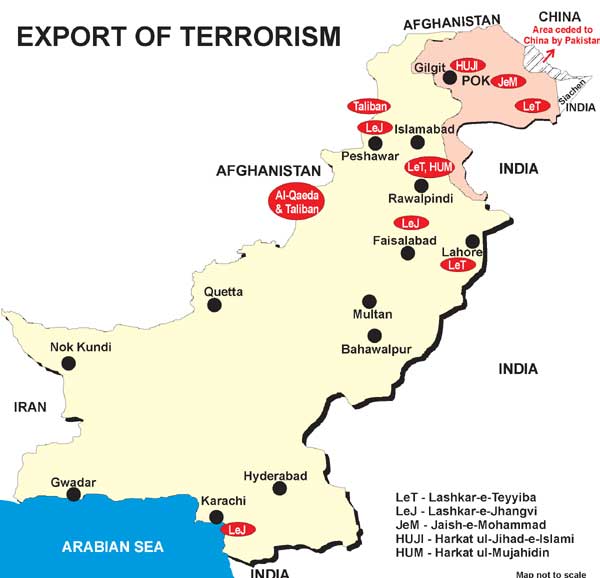Failure to do so would encourage the belief currently prevailing within the Pakistan army that its use of terrorists is a viable strategy. India has already made the biggest confidence building measure possible, by not retaliating to a single act of terrorism originating from Pakistan. ISI officials continue to plan terrorist attacks in India, knowing that they will not be targeted for assassination. Until November 2008, New Delhi remained on cordial terms with Islamabad, despite the urban bombing campaign by the so-called ‘Indian Mujahiddin’ (actually Lashkar-e-Toiba by another name). The Mumbai attacks broke this dynamic because Pakistan instead of reciprocating Indian goodwill, chose to ratchet up its proxy war. By sending Pakistani mercenaries to kill Indians under the cover of a non-existent terrorist group called ‘Deccan Mujahiddin’, the ISI overplayed its hand.
India has already made the biggest confidence building measure possible, by not retaliating to a single act of terrorism originating from Pakistan.
The fortuitous capture of Ajmal Kasab was a huge embarrassment for Pakistan. It initially attempted to bluff its way out by denying Kasab’s nationality, just as it had previously done with its soldiers in Kargil. In the first few hours after the attack, Indian media coverage only mentioned that the attackers had Pakistani links, without suggesting that they were state-sponsored. Islamabad responded to this restraint by claiming it was being made a scapegoat for India’s homegrown terrorist problem. Pakistani blame-shifting and obfuscation was what led to a hardening of Indian public opinion, not inflammatory media coverage. For some Indian journalists to now believe that their role in reporting the truth amounted to war-mongering, suggests a lack of professional integrity. They condemn jingoism while forgetting that excessive sentimentalism is equally dangerous.
Rather than preaching about the need for Indians and Pakistanis not to be held hostage by history, peace activists could first study that history in order to explain how it differs in any meaningful way from the present. Specifically, are they in any position to provide an assurance to their readers, on whose behalf they claim to speak, that Pakistan will convict those responsible for the Mumbai attacks? Instead of setting overly ambitious goals of freeing two countries from hatred, the Indian and Pakistani media could first combine forces to free 54 Indian Prisoners of War, being illegally held captive by Pakistan. If, as the initiators of the ‘Aman ki Asha’ farce claim, they are motivated by humanitarian considerations, they can set up forums for common people in both countries to denounce Lashkar-e-Toiba and its supporters. Only then will they command any credibility as representatives of popular opinion.
Rather than preaching about the need for Indians and Pakistanis not to be held hostage by history, peace activists could first study that history in order to explain how it differs in any meaningful way from the present.
Other initiatives could include asking the Pakistani government to shut down terrorist training camps, extradite Dawood Ibrahim, prosecute Hafeez Saeed, stop blocking Indian attempts to join the Organization of Islamic Countries (OIC) and stop ganging up with China to thwart India’s bid for a UN Security Council seat. Forward movement by Islamabad in even one of these areas would constitute a solid foundation for re-starting peace talks and would be more than reciprocated by India. Absence of any progress on the other hand, would demonstrate that the Pakistani desire for good relations extends only to cultivating Indian opinion-makers through fine food and paid holidays.
Evidence of such intellectual subversion already exists, in the form of arguments that a ’stable and prosperous Pakistan is in India’s interest’. Which Pakistan are these people talking about? The one that colonized Afghanistan in the 1990s while ostensibly seeking strategic depth and then further trying to extend its influence into Central Asia or the one that regularly diverts foreign aid money towards building up its India-centric war machine, or the one that survives on a narco-trafficking industry whose annual turnover equals 25 percent of the nation’s own GDP? Anyone who believes that a strong Pakistan would be a responsible state needs to read Michael Scheuer’s book Imperial Hubris. Scheuer, a former CIA analyst, describes the period 2000-2001 as representing a ‘golden moment’ for the Pakistani military elite. India was on the defensive in Kashmir and Afghanistan was firmly under the control of the Taliban. A quick review of Indian Home Ministry statistics for these years would reveal how many Indians died in terrorist attacks by Pakistan-based groups during the ‘golden moment’.
Rather than emulate the condescending arrogance of Western writers, who insist on bracketing India with Pakistan, would-be peaceniks should first come to terms with reality. They equate India with Pakistan as a victim of terrorism, without regard for the fact that Pakistan is a victim of its own terrorist-sponsoring policy, while India is a victim of proxy warfare. The two situations are not comparable on any level. Making any further peace overtures to Pakistan, without meaningful progress on the Mumbai investigations, would be tantamount to political suicide for whichever party tried it. Subversive propaganda such as ‘Aman ki Asha’ would not change the facts of the situation, only the way policymakers perceive them, to their own detriment.






There is annual growth in peace in India anyways. We do not want to involve with Pak now and disrupt their downfall. Let us steadily grow and ignore them. They anyways would harm eachother and the elites will flee their country. We should rather keep policies and protocols in place to keep the radical immigrants out in-case of a possible disintegration of Pakistan burdening all Indians.
We support the peacefull practice and humanity.
We defence lands and civilizations.
We’re adding our peacefull wishes to yours.India
We defence the higher culture.We’ll never break out.